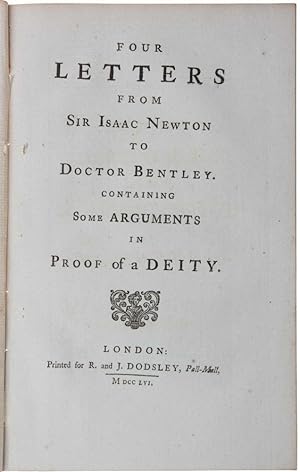About this Item
NEWTON'S SPECULATIONS. First printing, very rare, of these letters of Newton which Koyré has described as "one of the most precious and important documents for the study and interpretation of Newtonian thought" (Koyré, Newtonian Studies (1965), p. 202). Newton here gives his views on the nature of gravity, on the formation of the solar system, on action-at-a-distance, and much else. He even foresaw in these letters the modern theory of galaxy formation (see below). Newton had been very careful to exclude such speculative 'philosophical' comments from Principia: in its second edition he famously proclaimed "Hypotheses non fingo," or "I feign no hypotheses." Bentley had been asked to deliver the inaugural series of Boyle Lectures, which "had to demonstrate, among other things, that the new science - that is to say, the 'mechanical philosophy' of which Boyle had been so firm an adherent, and the heliocentric astronomy - which had been assured a definitive victory over ancient view by Newton's work, could not possible lead to materialism, but on the contrary offered a solid base for rejecting and confuting it . Bentley, a good theologian and an admirable philologist, was not prepared to deal with scientific questions. So, after having tried to acquaint himself with the difficulties and to surmount them by his own means, he decided to appeal to the master himself, and to ask whether or not the mathematical philosophy, and particularly Newtonian cosmology, could do without the intervention of a creative God or whether on the contrary they implied such intervention" (ibid.). "Richard Bentley follows so closely, and even so servilely, Newton's teaching, or lessons-he copied nearly verbatim the letters he received from him, adding, of course, some references to the Scriptures and a good deal of rhetoric-that the views he expresses can be considered as representing, in a large measure, those of Newton himself" (Koyré, From the Closed World to the Infinite Universe (1957), p. 179). The four letters which Newton wrote in response to Bentley's request were published as the present work. OCLC lists 5 copies, all in UK; there is also a copy at Harvard. No copy of these letters located in auction records in the last 75 years. "When the great English natural philosopher Robert Boyle died at the end of 1691, he endowed a lecture series designed to promote Christianity against what Boyle took to be the atheism that had infected English culture after the revolutionary period of the mid-century. Famous Newtonians such as Samuel Clarke and William Whiston would eventually give the Boyle lectures. The first "Boyle lecturer" was the theologian Richard Bentley (1662-1742), who would eventually become the Master of Newton'salma mater, Trinity College, Cambridge. When preparing his lectures for publication-they had been presented to a public audience in London in 1692-Bentley conferred with Newton, hoping to solicit his help in deciphering enough of thePrincipiato use its results as a bulwark against atheism. Newton obliged, and a famous correspondence between the two began (eventually published as [the present work]). The exchange is of great philosophical interest, for Bentley elicited a number of important clarifications that have no peer within Newton's publishedoeuvre" (Stanford Encyclopedia of Philosophy). Bentley's first letter is lost, but from Newton's reply we know that he must have "asked why some matter in the Universe formed the luminous Sun and other matter became the dark planets, whether the motions of the planets could arise from natural causes, whether the lower densities of the outer planets were caused by their distance from the Sun, and what produced the inclination of the Earth's axis. "In answering the first question, Newton made his famous prescient comments about the distribution of matter in the Universe: 'As to your first query, it seems to me that if the matter of our sun and planets and all the matter in the universe were ev. Seller Inventory # 3537
Contact seller
Report this item
![]()


